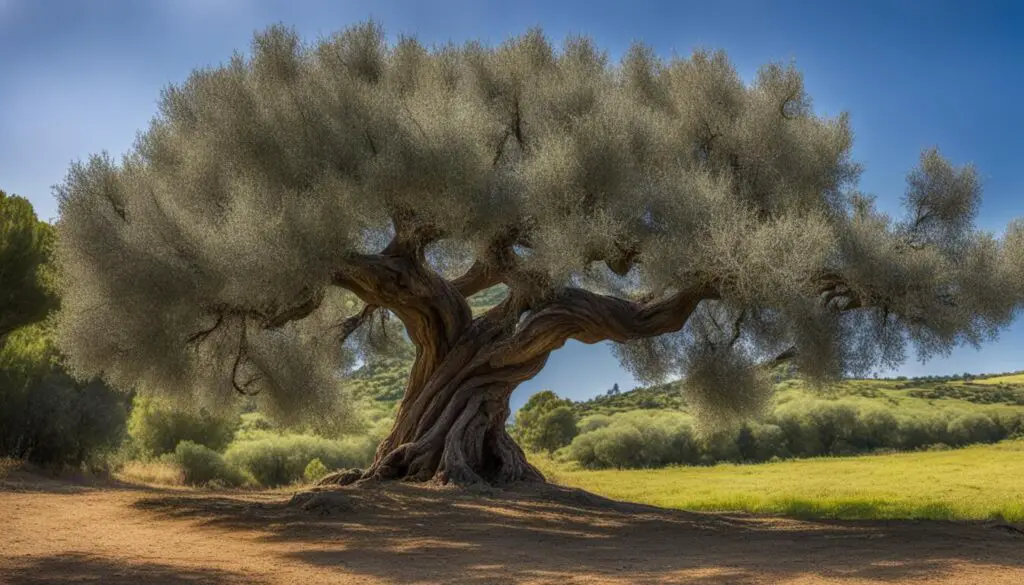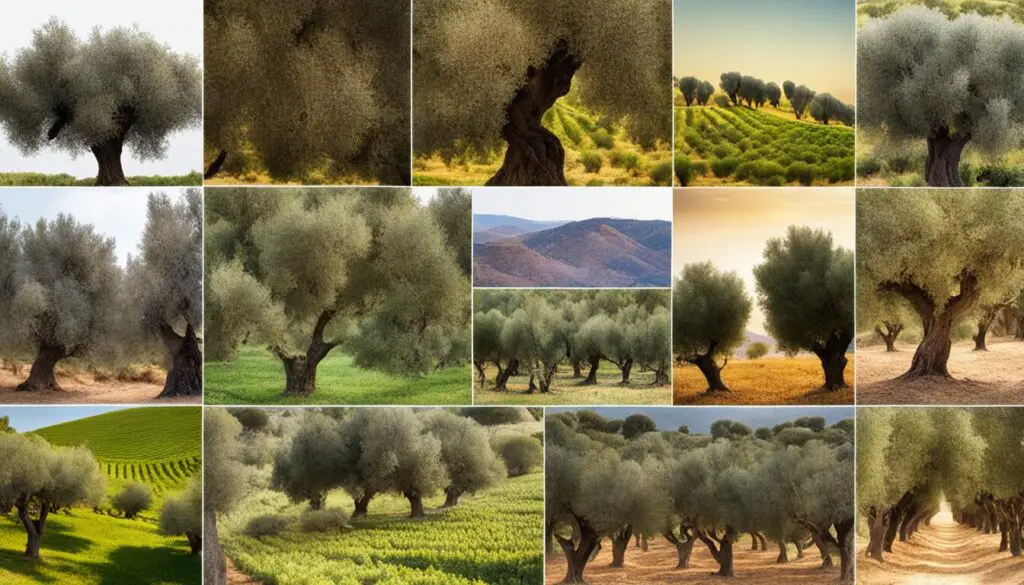In this article, we will explore the profound religious symbolism and biblical interpretations of the olive tree. Delve into its sacred essence and uncover its significance in the Bible.
The olive tree holds a significant place in the scriptures, representing peace, abundance, and fertility. It symbolizes the covenant people of God and their relationship with Him. Let’s embark on a journey to understand the true meaning of the olive tree in the Bible.
Throughout this exploration, we will examine the etymology of the olive tree, its mentions in various Bible verses, and its historical and cultural context. We will also delve into the interpretations provided by scholars and discover how the olive tree features in Bible stories.
As we venture into this fascinating topic, it’s important to note that there may be different opinions and interpretations regarding the symbolism of the olive tree in scripture. By considering various viewpoints, we can gain a comprehensive understanding of its true significance.
Finally, we will uncover how the symbolism of the olive tree continues to hold relevance in today’s world, allowing us to apply its wisdom to our modern lives and faith practices.
Key Takeaways:
- The olive tree symbolizes peace, abundance, and fertility in the Bible.
- It represents the covenant people of God and their relationship with Him.
- Hebrew and Greek words, “zayit” and “elaia,” are used to describe the physical tree and its symbolic meanings.
- Bible verses highlight the olive tree’s role in representing Israel and the blessings associated with them.
- Understanding the historical context enhances our understanding of the olive tree’s symbolism in the Bible.
Definition of Olive Tree in English
The olive tree holds great significance in the Bible, representing peace, abundance, and fertility. It is mentioned throughout the scriptures, symbolizing the covenant people of God and their relationship with Him.
Etymology of Olive Tree
The English term “olive tree” draws its roots from ancient languages, particularly Hebrew and Greek. In Hebrew, the word for olive tree is “zayit,” while in Greek, it is “elaia.” These words not only refer to the physical tree itself but also encompass its symbolic meanings in the Bible.
Bible Verses about the Olive Tree
The olive tree is referenced in various Bible verses, emphasizing its symbolic significance. These verses illuminate the olive tree’s role in representing Israel, the chosen people of God, as well as the blessings and promises associated with them. For example, in Romans 11:17-24, the Apostle Paul uses the olive tree as a metaphor for the relationship between the Gentile believers and the Jewish people, highlighting the concept of grafting.
“But if some of the branches were broken off, and you, although a wild olive shoot, were grafted in among the others and now share in the nourishing root of the olive tree, do not be arrogant toward the branches. If you are, remember it is not you who support the root, but the root that supports you.” – Romans 11:17-18
These verses demonstrate the olive tree’s significance in understanding the biblical narrative and its impact on the religious teachings of the time.
Etymology of Olive Tree
The olive tree holds a significant place in biblical references, symbolizing peace, prosperity, and spiritual growth. To fully appreciate its meaning in scripture, it is essential to explore its etymology rooted in ancient languages such as Hebrew and Greek.
In Hebrew, the word for olive tree is “zayit,” which not only refers to the physical tree but also carries symbolic connotations. The olive tree represents abundance, blessing, and the presence of God in the lives of His people. It is often associated with the fertility of the land and the covenant between God and Israel.
The Greek term for olive tree is “elaia,” which also conveys the same symbolic meaning. In the New Testament, the olive tree is a symbol of spiritual nourishment and the anointing of the Holy Spirit. It represents the believers’ union with Christ and the fruitful life that comes from abiding in Him.
Understanding the etymology of the olive tree provides a deeper insight into its biblical significance. It allows us to grasp the multifaceted meanings attached to this symbol and its profound spiritual implications for believers.

Biblical References to Olive Tree (Table)
| Verse | Book | Chapter: Verse | Meaning/Representation |
|---|---|---|---|
| Psalm 52:8 | Psalms | 52:8 | Righteousness and stability |
| Romans 11:17-24 | Romans | 11:17-24 | Israel as the olive tree, Gentile believers grafted in |
| Zechariah 4:3 | Zechariah | 4:3 | Spiritual anointing and empowerment |
| Genesis 8:11 | Genesis | 8:11 | Renewal, hope, and God’s faithfulness |
The olive tree is mentioned in various Bible verses, each highlighting its symbolic significance in different contexts. Psalm 52:8 portrays the righteous person as a flourishing olive tree, representing stability and righteousness. In Romans 11:17-24, the olive tree serves as a metaphor for Israel, with Gentile believers being grafted into it, symbolizing unity and inclusion. Zechariah 4:3 symbolizes the anointing of the Holy Spirit, empowering individuals for God’s work. Genesis 8:11 illustrates the olive leaf brought back by the dove after the flood, signifying renewal, hope, and God’s faithfulness.
These verses demonstrate the diverse meanings associated with the olive tree in scripture, highlighting its pervasive symbolism throughout the Bible.
Symbolic Significance of the Olive Tree in the Bible
The olive tree holds immense symbolic significance in the Bible, representing various key themes and elements. Let us explore some of the prominent Bible verses that shed light on the rich interpretation of the olive tree.
Bible Verses about the Olive Tree
1. In Psalm 52:8, it is written, “But I am like an olive tree flourishing in the house of God; I trust in God’s unfailing love forever and ever.” This verse portrays the olive tree as a symbol of flourishing life, trust, and the everlasting love of God.
2. In Romans 11:17-24, the olive tree is used as an analogy to explain the relationship between Israel and the Gentiles. It illustrates that the Gentiles are grafted into the cultivated olive tree, symbolizing their inclusion into the covenant people of God.
3. In Zechariah 4:11-14, the imagery of olive trees and olive oil is used to represent God’s anointed ones, the leaders who are empowered by His Spirit to carry out His divine purposes. It highlights the importance of God’s anointing and guidance in leadership.
| Bible Verse | Symbolism |
|---|---|
| Psalm 52:8 | Flourishing life, trust, and God’s unfailing love |
| Romans 11:17-24 | Inclusion of Gentiles into the covenant people of God |
| Zechariah 4:11-14 | God’s anointed leaders empowered by His Spirit |
“But I am like an olive tree flourishing in the house of God; I trust in God’s unfailing love forever and ever.”
– Psalm 52:8
The olive tree, through these verses, embodies concepts such as flourishing, inclusion, anointing, and trust. It signifies the abundant blessings, peace, and spiritual growth that God bestows upon His people.
Exploring the olive tree’s symbolism in the Bible enriches our understanding of its deeper meanings and enables us to apply its lessons to our lives today. Whether it is as a representation of flourishing life or God’s anointed ones, the olive tree serves as a powerful reminder of the enduring love and grace of the Divine.
Olive Tree in the Historical Context
In order to fully grasp the significance of the olive tree in the Bible, it is crucial to understand its historical context. Back in the day, olive trees were abundant in the region and held great importance for the people. They provided not only nourishment through their fruit but also oil for cooking, lighting, and anointing. The wood of the olive tree was also highly valued and used for various purposes.
The cultivation of olive trees dates back thousands of years, and their presence in the Bible reflects their cultural and economic significance. In biblical times, olive trees were often considered a symbol of prosperity, abundance, and blessing. Their longevity and resilience in harsh climates made them a powerful metaphor for endurance and steadfastness.
Olive Tree in the Bible
The Bible frequently references olive trees, highlighting their importance in the narrative. For example, in the story of Noah and the flood, an olive leaf brought by a dove signals the end of the devastating waters and the beginning of a new era. This symbolizes hope, renewal, and the restoration of peace.
Another significant biblical reference to the olive tree is found in the parable of the prodigal son. The father embraces his wayward son and celebrates his return by clothing him in the finest robe and placing a ring on his finger, signifying reconciliation and forgiveness. The son’s return is likened to the revival of a withered olive tree, emphasizing the theme of redemption and second chances.
The historical context enriches our understanding of the olive tree’s symbolism in the Bible and offers insights into the deeper meanings attached to this revered tree. By exploring its significance in biblical narratives, we can gain a greater appreciation for the spiritual lessons and messages conveyed through this enduring symbol.
Interpretation by Scholars
Scholars have extensively studied the symbolism of the olive tree in the Bible, offering a range of interpretations and insights into its meaning. Their perspectives contribute to a deeper understanding of the multifaceted nature of this symbolic tree and its relevance to religious teachings.
One interpretation proposed by scholars is that the olive tree represents God’s people, specifically the Israelites, who were chosen by God as His covenant people. Just as the olive tree produces rich and valuable fruit, the Israelites were meant to be a source of blessings and light to the world.
Another view is that the olive tree symbolizes peace and reconciliation. The olive branch, carried by a dove, was seen as a sign of peace after the Great Flood in the story of Noah. Scholars believe that the olive tree’s presence in other biblical narratives, such as the Garden of Gethsemane where Jesus prayed for peace, reinforces this symbol of harmony and unity.
“The olive tree in the Bible represents the continuity of God’s covenant with His people, the abundance of His blessings, and the call for peace and reconciliation among humanity.”
However, it’s important to note that interpretations can vary among scholars, leading to a diversity of opinions regarding the olive tree. Some scholars focus on the economic and agricultural significance of the olive tree in biblical times, highlighting its role as a source of sustenance and wealth. Others emphasize the tree’s resilience and longevity as a metaphor for the enduring nature of God’s love and faithfulness.
In conclusion, the interpretations provided by scholars reveal the rich symbolism and multifaceted meanings associated with the olive tree in the Bible. While there may be different opinions and perspectives, the significance of this symbol remains profound, inviting us to reflect on peace, abundance, and the enduring nature of God’s covenant with His people.

Olive Tree in Bible Stories
The olive tree holds a prominent place in various Bible stories, serving as a powerful symbol that conveys profound messages of faith and hope. Let us explore some of these stories and the significance of the olive tree within them.
Noah and the Flood
In the story of Noah and the Flood, the olive tree represents a message of rebirth and renewal. After the floodwaters receded, Noah sent out a dove, and it returned with an olive branch in its beak, signaling that the waters had receded and the land was once again fertile. This gesture symbolized God’s promise of new life and the restoration of the earth.
The Garden of Gethsemane
In the Garden of Gethsemane, olive trees played a significant role in one of the most pivotal moments in Christianity. It was here that Jesus prayed and surrendered to God’s will before his crucifixion. The olive trees witnessed his anguish and perseverance, serving as a poignant reminder of the depth of his sacrifice and the ultimate redemption that would follow.
“Then Jesus went with them to a place called Gethsemane, and he said to his disciples, ‘Sit here, while I go over there and pray.’” – Matthew 26:36
The Parable of the Olive Tree
In the Parable of the Olive Tree found in the book of Jacob in the Book of Mormon, the olive tree is used as an allegory to teach about God’s love, mercy, and the importance of repentance. It illustrates the relationship between God and His people, highlighting the need for nourishment, pruning, and cultivation to bear good fruits of righteousness.
These stories and many more demonstrate the rich symbolism and spiritual significance of the olive tree in the Bible. They inspire us to seek renewal, hope, and a closer connection with God.
| Bible Story | Symbolic Message |
|---|---|
| Noah and the Flood | Rebirth and renewal |
| The Garden of Gethsemane | Sacrifice and redemption |
| The Parable of the Olive Tree | God’s love and repentance |
Olive Tree Interpretations: Exploring Different Opinions
When it comes to the meaning of the olive tree in scripture, there are various interpretations and perspectives. Scholars and theologians have offered diverse insights that reflect the complexity and depth of this symbolic tree.
Some interpret the olive tree as a representation of peace, abundance, and spiritual growth. They emphasize its connection to the covenant people of God and the blessings and promises associated with them. Others view the olive tree as a symbol of endurance, highlighting its ability to thrive even in harsh conditions. This interpretation aligns with the notion of resilience and steadfastness in the face of challenges.
On the other hand, some scholars emphasize the olive tree’s role as a metaphor for the nation of Israel and its relationship with God. They see the branches of the olive tree as the Jewish people and the wild olive branches as the Gentiles, symbolizing the inclusion and grafting of all nations into God’s covenant. This interpretation speaks to the theme of unity and inclusivity within the biblical narrative.
“The olive tree serves as a powerful symbol of God’s faithfulness and provision throughout the scriptures. Its significance extends beyond its physical attributes, offering profound lessons on faith, unity, and spiritual growth.”
While there may be differing interpretations, the olive tree’s meaning in scripture remains a significant and contemplative topic for believers. It invites us to reflect on the multifaceted nature of God’s teachings and encourages us to seek a deeper understanding of our faith.
| Interpretation | Key Points |
|---|---|
| Symbol of peace, abundance, and growth | – Represents blessings and promises associated with the covenant people of God – Emphasizes spiritual growth and abundance |
| Metaphor for endurance and steadfastness | – Reflects the ability to thrive in challenging conditions – Highlights resilience and unwavering faith |
| Representation of unity and inclusivity | – Branches symbolize the Jewish people and the Gentiles – Demonstrates the inclusion of all nations in God’s covenant |
Table: Various Interpretations of the Olive Tree in Scripture
Olive Tree in Today’s World
The symbolism of the olive tree holds deep meaning and relevance in today’s world, encompassing spiritual, environmental, and cultural aspects. The olive tree is a powerful symbol of peace, unity, and resilience, transcending religious boundaries and resonating with people from various backgrounds.
Today, the olive tree continues to inspire a sense of harmony and tranquility. Its branches are often used as a symbol of peace, as seen in the olive branch offered as a gesture of reconciliation. The olive tree’s enduring presence in modern society reflects its timeless symbolism of hope, renewal, and the potential for positive change in a world that often faces conflicts and uncertainty.
Furthermore, the olive tree’s ecological significance cannot be overlooked. It is renowned for its ability to thrive in arid conditions and its capacity to prevent soil erosion. The cultivation of olive trees promotes sustainable agricultural practices and contributes to biodiversity, making it an essential part of efforts to combat climate change and preserve the environment for future generations.
“The olive tree is a powerful symbol of peace, unity, and resilience, transcending religious boundaries and resonating with people from various backgrounds.”
In addition to its spiritual and environmental significance, the olive tree plays a prominent role in various cultural traditions. Its oil is widely used in culinary practices, not only for its distinctive flavor but also for its health benefits. Olive oil is recognized for its high levels of monounsaturated fats and antioxidant properties, making it a staple in Mediterranean diets and a symbol of good health and well-being.
Overall, the olive tree’s symbolism in today’s world encompasses a range of meanings that touch upon spirituality, ecology, and culture. Its enduring presence in religious texts, environmental practices, and culinary traditions reflects its universal appeal and its ability to inspire and enrich our lives.
| Aspect | Meaning |
|---|---|
| Spirituality | Representing peace, unity, and hope |
| Ecology | Contributing to sustainability and combating climate change |
| Culture | Symbolizing health, well-being, and culinary traditions |
Conclusion
The Bible meaning of the olive tree is rooted in deep religious symbolism and biblical interpretations. Throughout the scriptures, the olive tree represents themes of peace, abundance, and spiritual growth. While interpretations may vary, the significance of the olive tree in the Bible remains relevant and compelling today.
From its English definition to its etymology in Hebrew and Greek, the olive tree holds a sacred essence in religious teachings. It is mentioned in various Bible verses, symbolizing the covenant people of God and the blessings and promises associated with them.
Scholars provide different perspectives and opinions on the symbolic meaning of the olive tree in scripture. Understanding their insights enriches our understanding of this multifaceted symbol. Exploring Bible stories that feature the olive tree, such as the story of Noah and the flood, deepens our appreciation for themes of rebirth, renewal, and hope.
In the historical context of biblical times, olive trees were essential for their fruit, oil, and wood. Today, the symbolism of the olive tree continues to hold significance in contemporary religious and spiritual contexts. Applying its wisdom to our lives and faith practices, we find guidance in themes of peace, abundance, and spiritual growth.
FAQ
What is the meaning of the olive tree in the Bible?
The olive tree in the Bible symbolizes peace, abundance, and fertility. It represents the covenant people of God and their relationship with Him.
What are the biblical references to the olive tree?
The Hebrew word for olive tree is “zayit,” and the Greek term is “elaia.” These words denote the physical tree as well as its symbolic meanings in the Bible.
How does the olive tree symbolize Israel and God’s blessings?
The olive tree is mentioned in various Bible verses, highlighting its symbolic significance. It represents Israel as the covenant people of God and the blessings and promises associated with them.
What was the cultural and historical importance of olive trees in biblical times?
Olive trees were prevalent in the region during biblical times and were vital for their fruit, oil, and wood. Understanding their significance enhances our understanding of their symbolism in the Bible.
What do scholars say about the symbolism of the olive tree?
Scholars provide interpretations and insights into the symbolism of the olive tree in the Bible. Their perspectives shed light on the multifaceted meanings associated with this tree and its relevance to religious teachings.
In which Bible stories does the olive tree feature prominently?
The olive tree is prominent in various Bible stories, such as the story of Noah and the flood. These stories highlight themes of rebirth, renewal, and hope associated with the olive tree.
Are there different interpretations of the olive tree’s meaning in scripture?
Yes, there are different perspectives and opinions on the meaning of the olive tree in scripture. It’s essential to consider different viewpoints and discern the most accurate and contextually relevant interpretations.
How does the symbolism of the olive tree hold significance in today’s world?
The symbolism of the olive tree continues to hold significance in contemporary religious and spiritual contexts. Understanding its meaning in today’s world helps us apply its wisdom to our lives and faith practices.
What is the conclusion on the meaning of the olive tree in the Bible?
While interpretations may vary, the significance of the olive tree in the Bible remains a compelling and relevant symbol today. It expresses themes of peace, abundance, and spiritual growth.








Leave a Reply